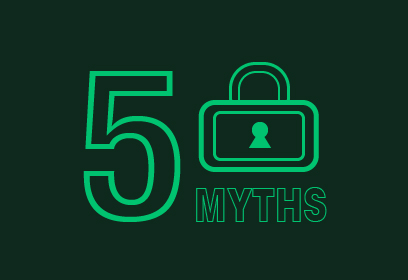Nowadays, getting an SSL certificate is becoming mandatory as its popularity is increasing every year. It is one of the best ways to secure your website and protect all the data transferred between your website and the end-user, Websites with SSL in place appear as HTTPS on browsers and are trusted by tech savvy users and as well as customers in general. Hosting Tribunal points out that 90.2% of browsing time on Google Chrome is spent on HTTPS pages, as people are more likely to exit a site that’s not secure. If you’re considering getting your own SSL certificate, be careful not to fall victim to the common myths listed below:
Only certain web-pages need SSL
There is a misconception that only a login page or pages that require financial information have to be secured with SSL. Unfortunately, hackers can alter the content of unsecured website resources and redirectthe customers to their own modified login pages, where confidential data may be stolen. Site owners who do this might find out the hard way that login details from hundreds of users were leaked. What’s more, the pages you choose not to secure may still contain sensitive information that can be stolen.
Please note that by having a nonsecure web-page you are putting internet users at risk. Special man-in-the-middle attack (MITM) attacks can be used to redirect users to any other page such as a fake PayPal webiste and collect payment information.
Only E-commerce websites need SSL
While having an SSL for a web store has a number of benefits, these advantages are not limited to e-commerce sites. For one thing, Chrome defaults to a secured version of any website, which is the HTTPS version with an SSL certificate. On top of that, SSL-secured websites show up higher on Google’s search results, generally ranking better for their overall SEO-friendly architecture. If a site does not have SSL installed, Google shows a warning page, which prompts users to either continue at their own risk or just exit the website. These days, internet users understand and appreciate a presence of an SSL certificate, as this shows that privacy and security is taken seriously.
Having an SSL means your website is hackproof
Despite SSL’s many security benefits, there are other online security measures the website owner must take. SSL functions as a secure tunnel through which information can flow safely, but what lies on the other end of that tunnel is not part of what’s secured. Many hackers can still take advantage of insecure code or software on the website if there is no other protection in place. That being said, all business owners should consider other security products and hiring an IT security team to cover all their bases in terms of cybersecurity. Yoss recommends hiring tech freelancers instead of full-time staff, as they often specialize in certain areas, while also being more cost-effective. This can be especially helpful for small business owners or entrepreneurs on a tight budget.

Having an SSL certificate will slow down your website loading speed
Adding the extra layer of SSL has been rumored to slow down websites loading times, but that’s just not true. In fact, a properly installed SSL can boost your website loading times by using the latest HTTP/2 protocol. The most popular websites like Facebook or YouTube, utlize SSL certificates and their web pages are loading quick. The speed would be limited only by your internet connection. Keep in mind that SSL still consumes an insignificantly small amount of bandwidth to create that safe tunnel for data to pass through. However, such small amount is insignificant and will get even smaller as the technology evolves over time.
Getting an SSL certifcate is too expensive
While this may have been true when the concept was new, SSL is now more accessible and cheaper than ever. There is a myriad of options now, and even a bunch of free or freemium ones you can choose from. CyberSSL.com helps you choose which certificate is the best for your site at different price points. You can check out the best offers here: https://www.cyberssl.com/ssl-certificates. There are also cheap SSL certificates for those on a tight budget: https://www.cyberssl.com/articles/cheap-ssl-certificates



